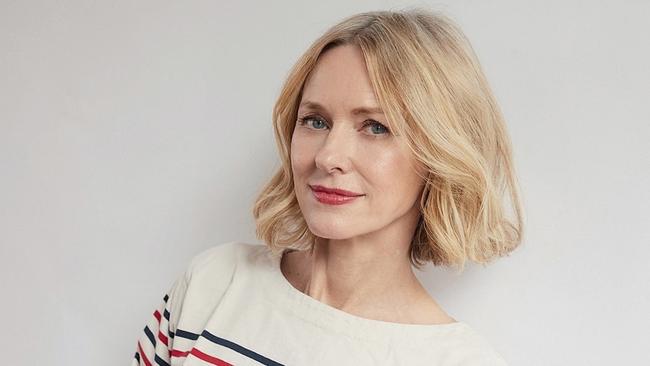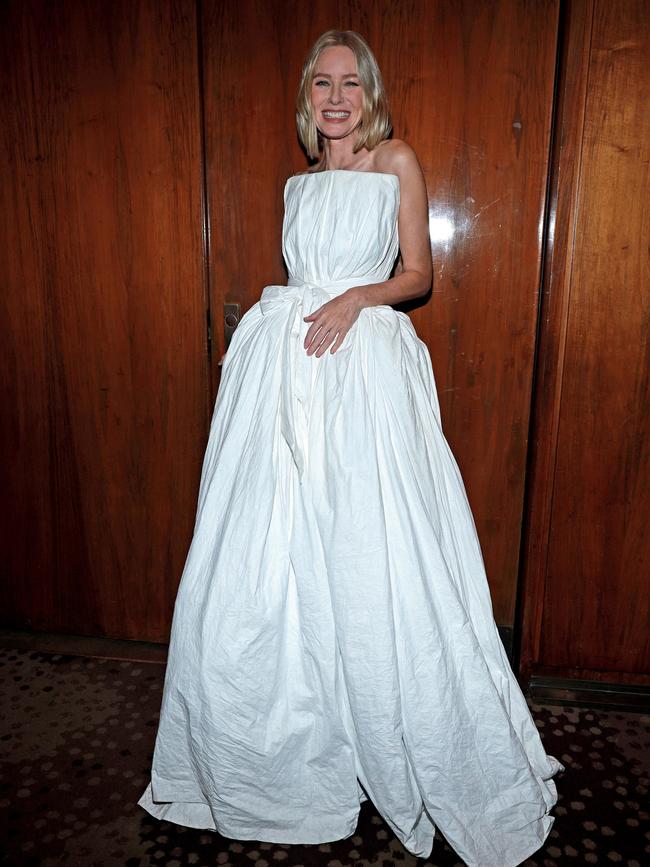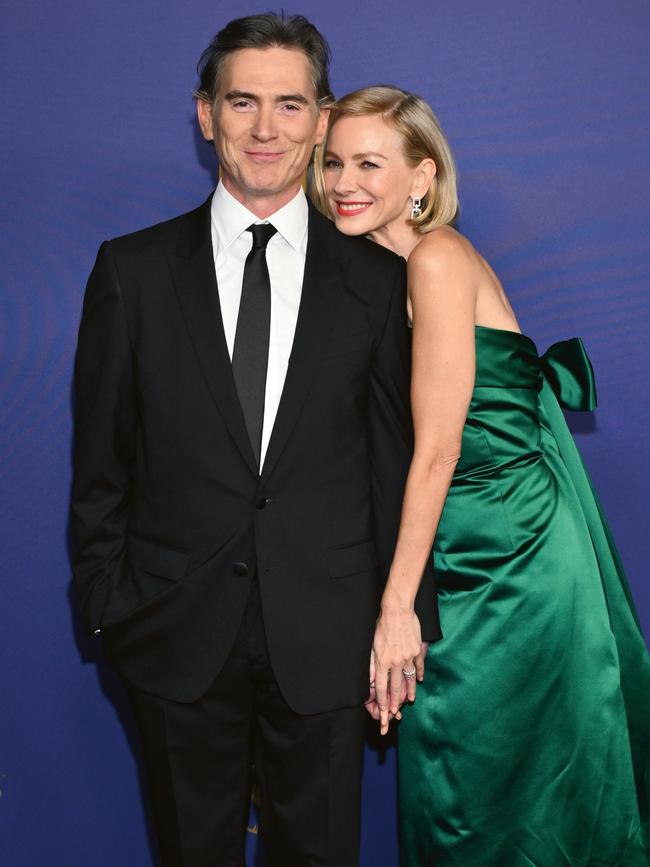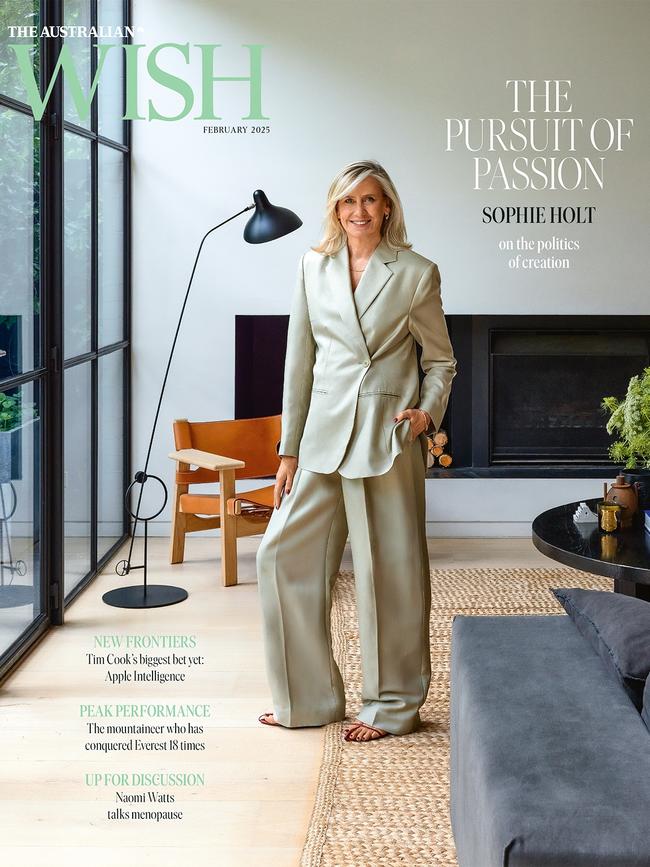In the menopause guide Dare I Say It actor Naomi Watts shares her tale of infertility and perimenopause at 36
The actor’s personal struggle inspired her to create the menopause guide she wished she had.

Every woman has a story of how she realised that menopause had come for her. For me, the close-to-menopause news came at the same time as the you-probably-won’t-get-naturally-pregnant news. I entered menopause and motherhood at more or less the same time, becoming in one fell swoop both mother and crone. And both struggles – with early menopause and infertility – had me drenched in sweat, confusion and shame.
I always dreamed I’d be a young mother but never got around to it. Then I found a partner who wanted to be a parent, too. Within three months, Liev and I had made the decision to start a family. [Watts was with former partner Liev Schrieber for 11 years. The couple split in 2016 and she married actor Billy Crudup in 2023.] I’d spent my entire adult life up to that point trying to avoid pregnancy and so once I felt ready, at age 36, I assumed I’d get pregnant on my first go – maybe my second or third at most. Months went by. Nothing. When I’d seen the doctor to find out why I wasn’t getting pregnant and been told I was nearing menopause, I coursed with shame.
What use am I if I can’t bear children? Did I become an old lady without even noticing? How could I have let this happen? What have I done wrong? I flashed back to every time I’d ever done something I knew was bad for me, every crash diet, being on birth control for 15 years. “My body doesn’t work because I abused it!”, I thought. “Of course it won’t let me have a baby, because I’m not fit to be a mother!” How does guilt and shame send you into such dark places and to beliefs you would never normally consider? It’s almost as if those feelings are the self-sabotaging you think you deserve. When in doubt, blame everything on yourself!
Even though Liev had been nothing but supportive, I was scared to tell him. I was gaslighting myself. I thought, “If he wants a family and I can’t have babies, he won’t want me anymore”. I felt that when I was told I was close to menopause, I’d been branded an unproductive, barren person. The shame bled into all parts of my life because I wasn’t being completely up front about this perhaps-futile pursuit to get pregnant, which was taking up every spare moment and part of my brain. But I pulled myself together and tried to focus on not being menopausal. And as much as possible I avoided talking about it with Liev or anyone else. I enlisted his help when I needed to, but I took it on mostly as my job to figure it out. Deep down, I believed this natural course of events could be altered on my own with enough hard work. I’d had to prove my worth in my career and in finding the right partner. Before those things happened, I’d made it clear how badly I wanted them so why should my fertility be any different? If it was my fault for ending up in this predicament, then surely I had the power to get myself out.

Yes, I know that’s stupid. In retrospect, if a woman said anything like that to me, I’d tell her, “We are much more than our fertility. There are plenty of ways to have a family. If you feel you can’t share something like this with your partner, maybe the relationship isn’t on a solid footing”. But at the time some regressive part of me thought, “Well, isn’t fertility part of women’s worth? Aren’t we here to reproduce?”. I was determined to get pregnant as soon as possible.
Because of my hormone levels, I wasn’t a candidate for IVF, but I tried fertility drugs like Clomid and procedures like intrauterine insemination (IUI). I would have eaten my dog’s toenails if someone told me it would help. I tracked my ovulation and checked my temperature on the regular. I even got scans to see the follicles and the eggs forming, and we’d have sex at the exact optimal moment for conception. None of it worked.
Since this was 18 years ago, the internet wasn’t yet what it is today. I couldn’t even find the chat rooms that did exist. Some friends of mine swore by Chinese medicine. I’d tried acupuncture already and some herbal teas. And as luck would have it, about five months into this process I went to shoot a movie in China. While the rest of the cast were sightseeing or resting on their days off, I was hunting down a top herbalist at a hospital in Beijing.
After having discussed my compromised fertility in great and graphic detail, and with plenty of mortifying hand gestures for sex, the doctor sent me away with a tonne of herbs. From that point on, I was boiling teas that would stink up any room I was in. When the movie wrapped, I smuggled giant laundry bags filled with teas back home and drank them every day for months.
Just thinking about those smells makes me gag now. Lots of people around me were saying, “Be careful of that stuff! Some herbs can hurt your liver!”. But at the time there was nothing I wouldn’t do to have a baby. “I’ll worry about my liver later,” I said. Eventually, an endocrinologist recommended a book called In-conceivable: A Woman’s Triumph over Despair and Statistics by Julia Indichova. The author had, as I did, an elevated FSH (follicle-stimulating hormone, which stimulates the ovaries to prepare eggs for ovulation and which also appears in higher levels in menopausal women). She’d tried everything the doctors had told her to do. Finally, she decided to develop her own program. The book made me feel real hope for the first time since this journey had begun.
Sometimes a simple sense of identification can be the beginning of healing. I started my own intuitive plan. I went on a very strict anti-inflammatory diet. I churned up wefts of wheatgrass every day. I began to feel that I lived in the produce section of Whole Foods. I was peeing on sticks constantly, both to track my ovulation and to check for pregnancy if my period was even an hour late. I was monitoring the pH of my vagina because I’d heard that sperm do better in an alkaline environment than an acidic one. I spent so much money, but I would have mortgaged my house to try to solve this problem. I became disheartened by the whole fertility process.
I began looking into adoption and I researched donor eggs as well. There was a brief moment when I thought my partner’s sperm might have been to blame, but nope, the tests showed he was fine.
Then I had one pregnancy. I thought, “This is it! I turned back the tide! I did the impossible!”. Less than two months later, I miscarried.
I was back to the starting point again. I’d come to learn that, according to the Mayo Clinic, at age 35, the miscarriage risk is about one in five; at age 40 the risk is 33 to 40 per cent. At age 45, it’s 57 to 80 per cent. Another few months went by, and nothing. The sperm and the egg were still not working together. And by this point, as a couple, we were losing steam. My obsession created a strain on our relationship. I was driving myself crazy, and the derangement was spreading. We were at the brink of giving up on a pregnancy and maybe each other.
What’s more, I was still struggling with shame about infertility – I kept the book Inconceivable hidden under my mattress. I was perplexed by how ill prepared I was for my new perimenopausal reality. How confusing it could be. One article I’ve since read about perimenopause described period durations month to month as having all the regularity of a locker combination; more likely to be 29-45-17 than 28-28-28.
Why had my doctors not found it important to help set me up for this thing that was always coming? Periods start. Then they stop. Period! It’s all part of the plan. It was always how it was supposed to go. It’s not a failing. Why is it shrouded in secrecy? And even when you own up to it, why is it so damn confusing?
In the midst of my own crisis over the toll fertility treatments were taking on me, I left to shoot the thriller Eastern Promises in London. A few weeks into the filming, I began to feel strange and I went to a pharmacy – I can still picture it – and bought a British pregnancy test. In my rented house, I stared at the test and saw the faintest line appear. Then slowly it got stronger until it was a full, clear, solid line. Undeniable. The line was yelling at me, “I’m here!” I called Liev and told him.
“Wow! Well, let’s see,” he said. He sounded thrilled but cautious and I was beside myself with joy, though also afraid I’d lose this pregnancy, too. It didn’t help that I had to ride a huge Russian motorbike for that movie. The director David Cronenberg adored motorbikes and was enthusiastic about me being the real rider. I’d ridden a Vespa before but this was a monster compared with that. I was up for the challenge.
After three or four motorbike lessons, I could ride around with seeming confidence, then park in front of the camera, take my helmet off, and shake out my hair. I tried to make it look effortless, but meanwhile, all that was running through my head during those scenes were terrified thoughts, “Oh my god, this is so dangerous! I don’t want to lose this baby! I cannot lose this baby!”.
I also didn’t want to tell anyone yet because it was so early, and because I didn’t want to be difficult, so I just kept going. It was yet another example of how as women we often do things that put us at risk in order to be team players.

A few weeks later, while I was doing a scene with Sinéad Cusack, I felt the first flutter. It was a sensation I’d never had in my life, but I knew instantly what it meant: the baby was moving around. The baby was real. The baby was fighting and strong. My eyes welled with tears. The scene was not sad. Crying made no sense in that moment, so it was good that the camera was focused on Sinéad. She stayed professional and made it through as though nothing was amiss. But after the take she said, “What happened? Are you OK?”.
I leaned over and whispered to her, “I’m pregnant, and I think I just felt the baby move for the first time”. Then I burst into tears.
I gave birth at 38 and I had my second baby very soon after, when I was 40. I guess my body had somehow learned the program to make babies. I was still breastfeeding when I got pregnant the second time, but the baby had teeth and was biting, so I was supplementing as well to give my breasts time to heal. I always knew I wanted more than one baby, though I didn’t expect it to happen so soon. I’d wanted more than two, actually, but alas, by that point time really had run out.
Several doctors told me women past 40 can, theoretically, still get pregnant naturally and they might not know when they’re in a fertile window because they might ovulate sporadically. If you’re having irregular cycles and seeing menopause-range numbers when you have your hormones tested, you could be in perimenopause, which can go on for even longer than a decade. Dr Sharon Malone warned, “Just because you’re in perimenopause, it doesn’t mean you can’t get pregnant. It’s less likely that you will conceive, however a higher percentage of the pregnancies in perimenopausal women are unplanned simply because they think they can’t get pregnant”.
The frustrations of perimenopause aren’t limited to women trying to get pregnant. Dr Suzanne Gilberg-Lenz, the legendary obstetrician and gynaecologist of Beverly Hills and author of Menopause Bootcamp, told me that the worst part of perimenopause is “the ups and the downs that people are having when their hormones are fluctuating, and they can’t predict how they’re going to feel on any given day”.
“I think when we arrange so much of our lives around our periods, we identify with them. It seems like we’re always supposed to somehow manage our cycle, trying to get pregnant or not get pregnant,” she said.
“We spend a lot of life preparing for menstruation, being in it, recovering from it. Then when our cycle is gone, we realise we’d psychologically and physiologically been living with this biological partner all those years. You don’t expect your period to become a hole in your life, but then it does.”
This really rang true to me. Being fertile women, as we’re reminded each month by our periods, we can become wrapped up in fertility being part of our identity. When our periods are suddenly gone, we question who we are and if we are suddenly whole new people. The world might see you differently, and you might see yourself differently, too. You might ask the big, panicky questions such as, “Who am I now?”. Or even darker ones such as “Am I invisible now? Is this the end?”.
“As in any grieving process, I think we have to give ourselves grace,” Dr Gilberg-Lenz told me. “I hit menopause recently, when my daughter turned 23. And I’m going to tell you, I immediately felt better. I said, ‘OK, so this is how dudes are? It’s great!’. I’m so much chiller now that I don’t have erratic cycles and surprise periods.”
One vibrant friend told me that, based on what she’d heard, she figured she’d enter menopause in her fifties. Then at age 42 she was at her gynaecologist for an annual exam, and the doctor said during an ultrasound, “I can’t find your ovaries because they’re so tiny and shrunken. I’m surprised you’re even still bleeding. You are approaching the end of the menopause season”.
Like me, she was completely shocked: “I had no idea. I wish someone had told me that when I was 39, the year that every single part of my body became unfamiliar to me – my digestive system, my skin, my hair, my emotions. It felt like a different body that I had to get used to. And I look back now and I see that was perimenopause. Had I had the language for that, I could have started hormones, or at least known that I wasn’t sick; it wasn’t a disease. It also wasn’t a mental health issue. It was this natural process.”
She mourned all the lost years of pleasure she might have had with better education. “Had that been even on the radar, I could have taken better care of myself. The advice that I would give to anybody is, if you’re feeling out of control of what’s happening in your body, get to the doctor quickly, advocate for yourself and ask for help. Read about it. Learn about it. I did everything late and I was always playing
catch-up. I could have addressed each symptom more effectively. Instead, I was screwed up for several years.”
Lately I’ve been having a lot of powerful conversations with women about the complicated feelings we’ve had about no longer being able to become pregnant. One friend of mine recently had an IUD inserted at the age of 48 to help her deal with heavy, irregular periods.

“I couldn’t believe how much it hurt getting it put in,” she told me after the appointment. “Why don’t they warn you? I started sobbing on the table. I was already emotional because I was thinking of it as the official end of my fertility – by the time it comes out I will likely be in full menopause and there will be no chance of another pregnancy. It made me sad to say goodbye to that period of my life, especially in such a painful way, even if it was on my own terms.”
A couple of weeks later, after the cramps from the insertion had stopped and she’d had some time to think, she felt better about the decision and that time of her life. My therapist said, “Don’t ever use the phrase ‘end of my fertility’ again! Fertility is much bigger than being able to get pregnant and give birth. It’s time now to think about what fertility means to you at this point in your life. Is it writing? Is it making art? Is it taking care of other people’s children? Is it being a good friend? No one is taking care of the earth and the people on it except for us. That’s fertility, too.”
This story is from the February issue of WISH.




To join the conversation, please log in. Don't have an account? Register
Join the conversation, you are commenting as Logout